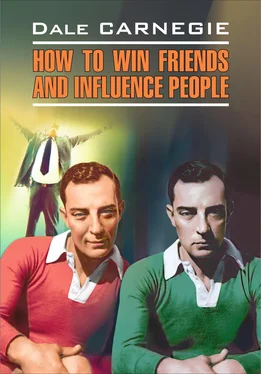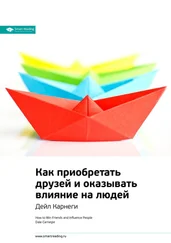4) What is the story McAdoo told?
5) Did Wilson always employ tact? Give the examples when he didn’t do it.
6) What did Gunter Schmidt do when he was told about an employee who was negligent about putting the proper price tags on the shelves?
7) Do you agree with Napoleon’s words “men are ruled by toys”?
8) Does technique of giving titles and authorities work for everybody?
9) How did Mrs. Ernest Gent apply this technique to protect her lawn?
10) What guidelines should an effective worker keep in mind when it is necessary to change attitudes or behavior?
11) When are people more likely to do what we would like them to do?
In a Nutshell
BE A LEADER
A leader’s job often includes changing your people’s attitudes and behavior. Some suggestions to accomplish this:
PRINCIPLE 1 Begin with praise and honest appreciation.
PRINCIPLE 2 Call attention to people’s mistakes indirectly.
PRINCIPLE 3 Talk about your own mistakes before criticizing the other person.
PRINCIPLE 4 Ask questions instead of giving direct orders.
PRINCIPLE 5 Let the other person save face.
PRINCIPLE 6 Praise the slightest improvement and praise every improvement. Be “hearty in your approbation and lavish in your praise.
PRINCIPLE 7 Give the other person a fine reputation to live up to.
PRINCIPLE 8 Use encouragement. Make the fault seem easy to correct.
PRINCIPLE 9 Make the other person happy about doing the thing you suggest.
A Shortcut to Distinction by Lowell Thomas
This biographical information about Dale Carnegie was written as an introduction to the original edition of How to Win Friends and Influence People. It is reprinted in this edition to give the readers additional background on Dale Carnegie.
It was a cold January night in 1935, but the weather couldn’t keep them away. Two thousand five hundred men and women thronged into the grand ballroom of the Hotel Pennsylvania in New York. Every available seat was filled by half-past seven. At eight o’clock, the eager crowd was still pouring in. The spacious balcony was soon jammed. Presently even standing space was at a premium, and hundreds of people, tired after navigating a day in business, stood up for an hour and a half that night to witness – what?
A fashion show?
A six-day bicycle race or a personal appearance by Clark Gable?
No. These people had been lured there by a newspaper ad. Two evenings previously, they had seen this full-page announcement in the New York Sun staring them in the face:
Learn to Speak Effectively
Prepare for Leadership
Old stuff? Yes, but believe it or not, in the most sophisticated town on earth, during a depression with 20 percent of the population on relief, twenty-five hundred people had left their homes and hustled to the hotel in response to that ad.
The people who responded were of the upper economic strata – executives, employers and professionals.
These men and women had come to hear the opening gun of an ultramodern, ultrapractical course in “Effective Speaking and Influencing Men in Business” – a course given by the Dale Carnegie Institute of Effective Speaking and Human Relations.
Why were they there, these twenty-five hundred business men and women?
Because of a sudden hunger for more education because of the depression?
Apparently not, for this same course had been playing to packed houses in New York City every season for the preceding twenty-four years. During that time, more than fifteen thousand business and professional people had been trained by Dale Carnegie. Even large, skeptical, conservative organizations such as the Westinghouse Electric Company, the McGraw-Hill Publishing Company, the Brooklyn Union Gas Company, the Brooklyn Chamber of Commerce, the American Institute of Electrical Engineers and the New York Telephone Company have had this training conducted in their own offices for the benefit of their members and executives.
The fact that these people, ten or twenty years after leaving grade school, high school or college, come and take this training is a glaring commentary on the shocking deficiencies of our educational system.
What do adults really want to study? That is an important question; and, in order to answer it, the University of Chicago, the American Association for Adult Education, and the United Y. M. C. A. Schools made a survey over a two-year period.
That survey revealed that the prime interest of adults is health. It also revealed that their second interest is in developing skill in human relationships – they want to learn the technique of getting along with and influencing other people. They don’t want to become public speakers, and they don’t want to listen to a lot of high-sounding talk about psychology; they want suggestions they can use immediately in business, in social contacts and in the home.
So that was what adults wanted to study, was it?
“All right,” said the people making the survey. “Fine. If that is what they want, we’ll give it to them.”
Looking around for a textbook, they discovered that no working manual had ever been written to help people solve their daily problems in human relationships.
Here was a fine kettle of fish! For hundreds of years, learned volumes had been written on Greek and Latin and higher mathematics – topics about which the average adult doesn’t give two hoots. But on the one subject on which he has a thirst for knowledge, a veritable passion for guidance and help – nothing!
This explained the presence of twenty-five hundred eager adults crowding into the grand ballroom of the Hotel Pennsylvania in response to a newspaper advertisement. Here, apparently, at last was the thing for which they had long been seeking.
Back in high school and college, they had pored over books, believing that knowledge alone was the open sesame to financial and professional rewards.
But a few years in the rough-and-tumble of business and professional life had brought sharp disillusionment. They had seen some of the most important business successes won by men who possessed, in addition to their knowledge, the ability to talk well, to win people to their way of thinking, and to “sell” themselves and their ideas. They soon discovered that if one aspired to wear the captain’s cap and navigate the ship of business, personality and the ability to talk are more important than a knowledge of Latin verbs or a sheepskin from Harvard.
The advertisement in the New York Sun promised that the meeting would be highly entertaining. It was.
Eighteen people who had taken the course were marshaled in front of the loudspeaker – and fifteen of them were given precisely seventy-five seconds each to tell his or her story. Only seventy-five seconds of talk, then “bang” went the gavel, and the chairman shouted, “Time! Next speaker!”
The affair moved with the speed of a herd of buffalo thundering across the plains. Spectators stood for an hour and a half to watch the performance.
The speakers were a cross section of life: several sales representatives, a chain store executive, a baker, the president of a trade association, two bankers, an insurance agent, an accountant, a dentist, an architect, a druggist who had come from Indianapolis to New York to take the course, a lawyer who had come from Havana in order to prepare himself to give one important three-minute speech.
The first speaker bore the Gaelic name Patrick J. O’Haire. Born in Ireland, he attended school for only four years, drifted to America, worked as a mechanic, then as a chauffeur.
Now, however, he was forty, he had a growing family and needed more money, so he tried selling trucks. Suffering from an inferiority complex that, as he put it, was eating his heart out, he had to walk up and down in front of an office half a dozen times before he could summon up enough courage to open the door. He was so discouraged as a salesman that he was thinking of going back to working with his hands in a machine shop, when one day he received a letter inviting him to an organization meeting of the Dale Carnegie Course in Effective Speaking.
Читать дальше
Конец ознакомительного отрывка
Купить книгу












